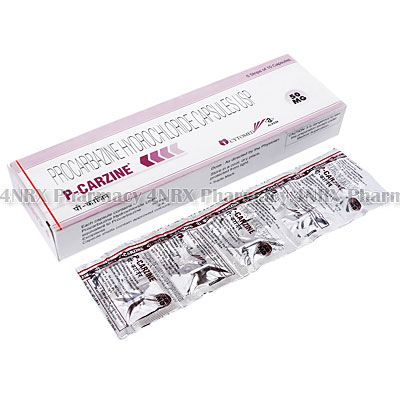 |
Home  Antiviral Antiviral  P-Carzine (Procarbazine HCL) P-Carzine (Procarbazine HCL) |
|
|||||||||
|
P-Carzine (Procarbazine HCL)
What is P-Carzine (Procarbazine HCL) used for? P-Carzine (Procarbazine HCL) is a type of chemotherapy drug that is used together with other drugs to treat Hodgkin's lymphoma. This drug prevents the growth of cancer cells, and the creation of newer cancer cells. It may also be used to treat different types of cancer, such as brain tumors. How should I use P-Carzine (Procarbazine HCL)? P-Carzine (Procarbazine HCL) capsules are taken orally. The exact dosage required varies, depending on the patient's weight, other drugs currently being taken, and their response to treatment. You should always consult your physician so that the correct dosage can be prescribed to you. Patients will experience side effects while taking this medication, however you should continue taking this drug unless directed to do otherwise by your physician. What are the side effects of P-Carzine (Procarbazine HCL)? Some side effects which have occurred in patients taking P-Carzine (Procarbazine HCL) include:
This drug may also cause more serious side effects to occur. Consult your physician immediately if you notice stiffness in the neck, pain in the chest, severe headaches, an increase in perspiration, unusual bruising, fever, or difficulties urinating. Please Note Strictly follow all instructions provided to you by your physician or pharmacist while using P-Carzine (Procarbazine HCL). Optimum and safe dosage can differ based on the patient and the condition being treated. As this medication may be unsafe for certain patients, it is essential you always inform your physician if you are pregnant or breastfeeding, as well as if you have any allergies, other illnesses, or ongoing health conditions, and if you are taking any other form of medication, supplements, or herbal products. Patients should avoid alcoholic beverages and other products that contain alcohol, such as mouthwash or vinegar, while taking this drug as this may cause a severe reaction to occur. This drug should not be taken with any other MAO inhibitors. Immediately seek emergency medical care if you have any allergic or hypersensitive reaction. Common signs of a reaction include hives, swelling, skin rashes, chest pains, as well as trouble breathing or swallowing. 
|
|||||||||||||||||